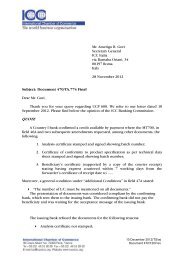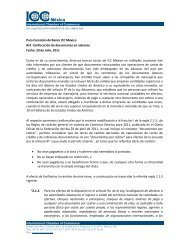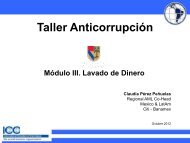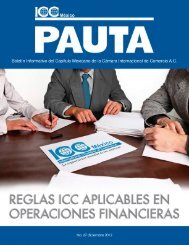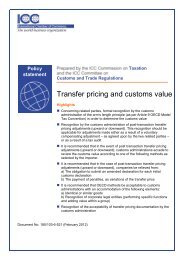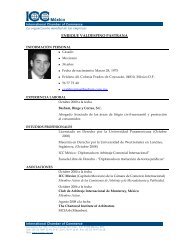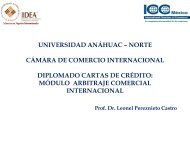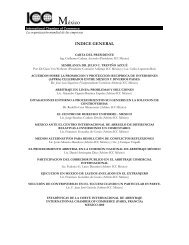Create successful ePaper yourself
Turn your PDF publications into a flip-book with our unique Google optimized e-Paper software.
<strong>Ms</strong>. Amalie <strong>Butze</strong>ICC DenmarkBoersen1217 Copenhagen KDenmark18 August 2011Subject: <strong>Document</strong> <strong>470</strong>/<strong>TA.750</strong><strong>Dear</strong> <strong>Ms</strong>. <strong>Butze</strong>,<strong>Than</strong>k you for your query regarding UCP 600. Please find below the opinion ofthe ICC Banking Commission Group of Experts and Officers.QUOTEWe kindly ask for your official opinion to the following query related todocuments presented under a documentary credit issued subject to UCP 600.An ocean carrier (“Carrier”) has replaced its agency (“Agent”) in the UK by aregistered branch office (“Branch”). Since the Branch is part of the Carrier companyand not an independent legal entity, as was the Agency, the bills of lading issued inthe UK by the Branch are effectively issued by the Carrier itself. Consequently, theCarrier’s bills of lading are no longer signed by the local agent “as agent”, but by thelocal Branch “as carrier”:New form:“Signed as the Carrier [Name of Carrier][Signature of the branch][Name of Branch] (branch)”It should be noted that the names of the Branch and the Carrier are not identical.The bank rejected the bill of lading and subsequently argued as follows:“It [the bill of lading] needs to be signed as I have shown it below. If it is not signedthis way then the sign off does not conform to UCP 600 as it does not clearly showthat [the Branch] are the agents for the carrier [Carrier]. […]Signed as the Carrier [Carrier][Signature] [Branch] (branch) AS AGENTS”(Emphasis added)– 22 –<strong>Document</strong> <strong>470</strong>/1175
The ocean carrier responded:“[The new form] signature fulfils the requirements of articles 19-21 of the UCP 600which require that:- the bill of lading indicates the name of the carrier; and- the capacity of the party signing must be included.The commentary to the UCP 600 (provided by the UCP 600 drafting group)explains that "...whatever the name of the company that issued the transportdocument, an indication to the effect that the issuing company or another companyis the carrier is required. This requirement will also be fulfilled if the party signingthe document indicates that it is signing "as carrier...". Clearly our proposal "Signedas Carrier..." satisfies this requirement as it directly names the carrier.The commentary goes on to state that "if the party is signing as agent, the nameof that agent must be included, as well as the capacity in which it is signing". As [theBranch] is not signing as agent, this is not relevant. The UCP 600 makes no referenceto branch set-ups, however we are obliged to fulfill the requirement to state thecapacity of the party signing, which is the branch. This does not alter the fact that[the carrier] is the carrier as they are the same legal entity.”Further, it would seem that the form requested by the bank is contradictory inthat it states “signed as carrier” (above the signature) and “as agent” (under thesignature). Clearly, the signatory cannot be both carrier and agent.To the ocean carrier’s reply, the bank responded:“We, as a bank, are not obliged to understand the legal standing and linkage ofcompanies and are not expected to either. We still would regard this as a discrepancyas [the Branch] should be identified as agents.”Since the Branch, as stated above, is a part of the Carrier company, it would belegally wrong to classify it as “agent”, since that requires the agent to be a legal entitythat is separate from the carrier.Indeed, the bank is correct that it should not be obliged to understand thecorporate structure of the signatories or carriers. In this case, however, the bill oflading clearly states that the branch signs as carrier, and such express statement mustbe compliant. The fact that the branch has a different name than that of the carrier(although being part of same) should not make the signature form discrepant either.– 23 –<strong>Document</strong> <strong>470</strong>/1175
In light of the above you are kindly requested to assist in the interpretation ofUCP 600 sub-article 20 (a) (i) as for:1. whether the ocean carrier’s new signature form is sufficiently clear todetermine the capacity of the signatory as carrier i.e., if it is acceptable that abranch (however named) of the carrier signs the bill of lading.2. whether, generally, a transport document that specifically states “Signed as theCarrier” followed by a signature, regardless of how the signatory is named,complies with the relevant provisions in articles 19 to 25.ANALYSISQuestion 1A bill of lading must be signed in accordance with UCP 600 sub-article 20 (a) (i):“A bill of lading, however named, must appear to:i. indicate the name of the carrier and be signed by:• the carrier or a named agent for or on behalf of the carrier, or• the master or a named agent for or on behalf of the master.Any signature by the carrier, master or agent must be identified as that of the carrier,master or agent.Any signature by an agent must indicate whether the agent has signed for or onbehalf of the carrier or for or on behalf of the master.”The bill of lading in question has been signed as follows:“Signed as the Carrier [Name of Carrier][Signature of the branch],[Name of Branch] (branch)”It is stated that the names of the branch and the carrier are not identical.The signatory is apparently identified as a branch, of the stated carrier, and, as such,does not act as an agent. The fact that it is a branch in a country different to theparent company is not relevant. Neither is the fact that the name of the branch differsto the name of the carrier.– 24 –<strong>Document</strong> <strong>470</strong>/1175
The bill of lading clearly indicates the name of the carrier. Any of its branches mayissue bills of lading and sign them as a branch of the named carrier.The bill of lading thus fulfils the requirements of sub-article 20 (a) (i) by indicating:(a) the name of the carrier [Carrier](b) that the signature is that of the carrier: “Signed as the Carrier [Name ofBranch], Branch”.Question 2UCP 600 sub-articles 19 (a) (i), 20 (a) (i), 21 (a) (i), 23 (a) (i) and 24 (a) (i) stipulateprovisions related to the signing of transport documents by a carrier.In accordance with these provisions, a signature by the carrier must be identified asthat of the named carrier.A transport document that is signed by the use of expressions such as 'signed as thecarrier' or 'as carrier' or 'carrier' will be acceptable provided it identifies the namedparty (i.e., the named carrier) for whom the signature was given.The signatory and the carrier must be the same entity, which will include thepossibility of the signatory being a branch of the named carrier, provided it isidentified as such.CONCLUSIONQuestion 1The signature form as described in the enquiry complies with the requirementsstated in UCP 600 sub-article 20 (a) (i) in relation to the identification of the carrierand the manner in which the bill of lading is to be signed.Question 2A document issued in the manner described under analysis will be acceptable.The opinion(s) rendered on this query reflect the opinion of the ICCBanking Commission’s Group of Experts and Officers based on the facts under“QUOTE” above. They do not necessarily reflect the opinion of the ICCBanking Commission until the Banking Commission renders its approval ordisapproval of these opinion(s) at the next scheduled meeting.– 25 –<strong>Document</strong> <strong>470</strong>/1175
The reply given is not to be construed as being other than solely for thebenefit of guidance and there should be no legal imputation associated withthe reply offered. If this query relates to a matter currently underconsideration by the courts, the ICC Banking Commission will refrain fromconsidering it for adoption as an opinion.Neither the ICC nor any of its employees, nor any member of the BankingCommission, including the Chairman, Vice-Chairmen, Technical Adviser orany of the Group of Experts shall be liable to any person for any loss ordamage arising out of any act or omission in connection with the renderedopinion(s).Yours sincerely,Thierry SenechalSenior Policy ManagerBanking Commission– 26 –<strong>Document</strong> <strong>470</strong>/1175



